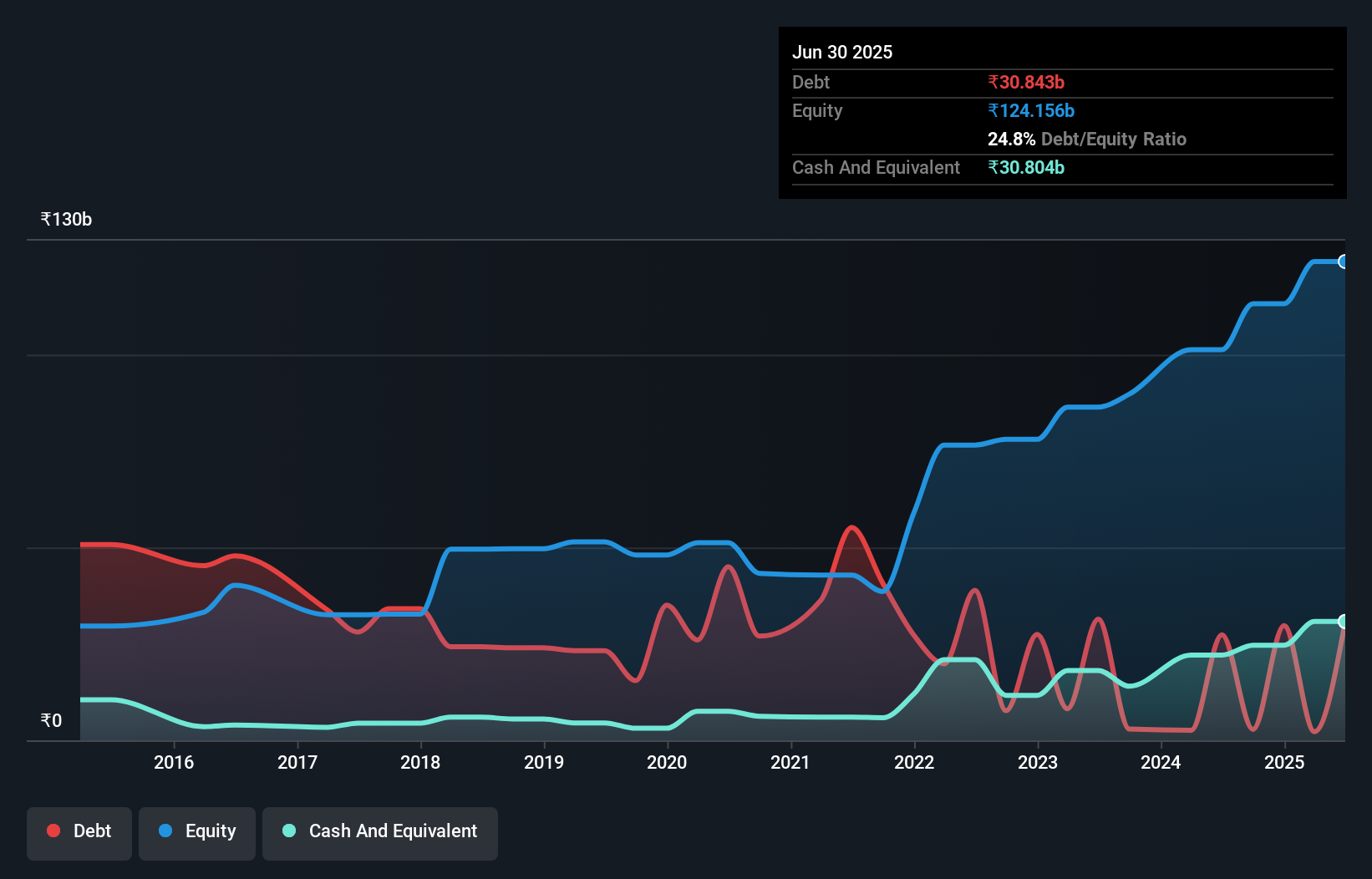David Iben put it well when he said, 'Volatility is not a risk we care about. What we care about is avoiding the permanent loss of capital.' When we think about how risky a company is, we always like to look at its use of debt, since debt overload can lead to ruin. We note that The Indian Hotels Company Limited (NSE:INDHOTEL) does have debt on its balance sheet. But should shareholders be worried about its use of debt?
When Is Debt Dangerous?
Generally speaking, debt only becomes a real problem when a company can't easily pay it off, either by raising capital or with its own cash flow. In the worst case scenario, a company can go bankrupt if it cannot pay its creditors. However, a more frequent (but still costly) occurrence is where a company must issue shares at bargain-basement prices, permanently diluting shareholders, just to shore up its balance sheet. By replacing dilution, though, debt can be an extremely good tool for businesses that need capital to invest in growth at high rates of return. When we examine debt levels, we first consider both cash and debt levels, together.
What Is Indian Hotels's Debt?
You can click the graphic below for the historical numbers, but it shows that as of March 2025 Indian Hotels had ₹30.8b of debt, an increase on ₹27.4b, over one year. However, it also had ₹30.8b in cash, and so its net debt is ₹38.4m.

How Healthy Is Indian Hotels' Balance Sheet?
According to the last reported balance sheet, Indian Hotels had liabilities of ₹20.0b due within 12 months, and liabilities of ₹32.9b due beyond 12 months. Offsetting these obligations, it had cash of ₹30.8b as well as receivables valued at ₹7.68b due within 12 months. So it has liabilities totalling ₹14.4b more than its cash and near-term receivables, combined.
This state of affairs indicates that Indian Hotels' balance sheet looks quite solid, as its total liabilities are just about equal to its liquid assets. So it's very unlikely that the ₹1.09t company is short on cash, but still worth keeping an eye on the balance sheet. But either way, Indian Hotels has virtually no net debt, so it's fair to say it does not have a heavy debt load!
See our latest analysis for Indian Hotels
We measure a company's debt load relative to its earnings power by looking at its net debt divided by its earnings before interest, tax, depreciation, and amortization (EBITDA) and by calculating how easily its earnings before interest and tax (EBIT) cover its interest expense (interest cover). The advantage of this approach is that we take into account both the absolute quantum of debt (with net debt to EBITDA) and the actual interest expenses associated with that debt (with its interest cover ratio).
With debt at a measly 0.0013 times EBITDA and EBIT covering interest a whopping 12.3 times, it's clear that Indian Hotels is not a desperate borrower. So relative to past earnings, the debt load seems trivial. On top of that, Indian Hotels grew its EBIT by 38% over the last twelve months, and that growth will make it easier to handle its debt. The balance sheet is clearly the area to focus on when you are analysing debt. But ultimately the future profitability of the business will decide if Indian Hotels can strengthen its balance sheet over time. So if you want to see what the professionals think, you might find this free report on analyst profit forecasts to be interesting.
Finally, while the tax-man may adore accounting profits, lenders only accept cold hard cash. So it's worth checking how much of that EBIT is backed by free cash flow. During the last three years, Indian Hotels produced sturdy free cash flow equating to 57% of its EBIT, about what we'd expect. This free cash flow puts the company in a good position to pay down debt, when appropriate.
Our View
The good news is that Indian Hotels's demonstrated ability to cover its interest expense with its EBIT delights us like a fluffy puppy does a toddler. And the good news does not stop there, as its EBIT growth rate also supports that impression! Overall, we don't think Indian Hotels is taking any bad risks, as its debt load seems modest. So the balance sheet looks pretty healthy, to us. There's no doubt that we learn most about debt from the balance sheet. But ultimately, every company can contain risks that exist outside of the balance sheet. To that end, you should be aware of the 1 warning sign we've spotted with Indian Hotels .
Of course, if you're the type of investor who prefers buying stocks without the burden of debt, then don't hesitate to discover our exclusive list of net cash growth stocks, today.
New: AI Stock Screener & Alerts
Our new AI Stock Screener scans the market every day to uncover opportunities.
• Dividend Powerhouses (3%+ Yield)
• Undervalued Small Caps with Insider Buying
• High growth Tech and AI Companies
Or build your own from over 50 metrics.
Have feedback on this article? Concerned about the content? Get in touch with us directly. Alternatively, email editorial-team (at) simplywallst.com.
This article by Simply Wall St is general in nature. We provide commentary based on historical data and analyst forecasts only using an unbiased methodology and our articles are not intended to be financial advice. It does not constitute a recommendation to buy or sell any stock, and does not take account of your objectives, or your financial situation. We aim to bring you long-term focused analysis driven by fundamental data. Note that our analysis may not factor in the latest price-sensitive company announcements or qualitative material. Simply Wall St has no position in any stocks mentioned.
About NSEI:INDHOTEL
Indian Hotels
Owns, operates, and manages hotels, palaces and resorts in India and internationally.
Flawless balance sheet with proven track record.
Similar Companies
Market Insights
Community Narratives





